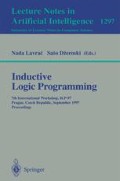Abstract
We propose in this paper a new approach for learning predicate definitions from examples and from an initial theory. The particularity of this approach consists in inventing both a new predicate symbol and a specification for this predicate at most steps of learning. The specifications that are built are incomplete and imprecise, what is modelized by introducing the notion of a-interpretation. At the end of the learning task, some invented predicates are removed by unfolding techniques. The remaining predicates either enable to simplify the program, or are defined by recursive programs. In the second case, the program could not have been learned without inventing these predicates. The method has been implemented in a system, called SPILP, which has been successfully tested for inventing predicates which simplify the learned programs as well as for inventing recursively defined predicates. Let us point out that the introduction of σ-interpretations gives us a general framework for dealing with imprecise specifications and that SPILP can work, even when the target concepts are also incompletely defined by σ-interpretations.
Preview
Unable to display preview. Download preview PDF.
References
Dietterich T.G., Lathrop R.H., Lozano-Perez T., 1996. Solving the MultipleInstance Problem with Axis-Parallel Rectangles. to be published in Artificial Intelligence Journal.
Kijsirikul B., Numao M. et al, 1992. Discrimination-based Constructive Induction of Logic Programs, Procs. of AAAI-92, San Jose, pp.44–49, 1992.
Lavrač N., Džeroski S., 1992. Inductive Learning of Relations from Noisy Examples. Inductive Logic programming. The A.P.I.C. Series N° 38, S. Muggleton (Ed.), Academic Press, pp.495–516.
Lapointe S., Ling C., Mawin S., 1993. Constructive Inductive Logic Programming. Procs. of the Sixteenth International Joint Conference on Artificial Intelligence (IJCAI-93), pp. 1030–1036, 1993.
J. W. Lloyd. Foundations of Logic Programming. Springer Verlag, 1987.
Martin L., Vrain C., 1996. Induction of Constraint Logic Programs. Procs. of the Seventh International Whorkshop on Algorithmic Learning Theory, Lecture Notes in Artificial Intelligence
Muggleton S., 1987. Duce, an oracle based approach to constructive induction, Procs. of the Tenth International Joint Conference on Artificial Intelligence (IJCAI87), Milan, pp. 287–292, 1987.
Muggleton S., 1988. A strategy for constructing new predicates in first order logic. Procs. of the 3rd European Working Session on Learning, Pitman, pp. 123–130, 1988.
Muggleton S., Buntine W. (1988) Machine invention of first order predicates by inverting resolution. Procs. of the Fifth Internationnal Conference on Machine Learning, pp. 339–351, 1988.
Muggleton S., Feng C., 1992. Efficient Induction of Logic Programs". Inductive Logic programming. The A.P.I.C. Series N° 38, S. Muggleton (Ed.), Academic Press. pp. 281–298.
Muggleton S., de Raedt L., 1994. Inductive Logic Programming: Theory and Methods. Journal of Logic programming, vol. 19/20, May/July 94, pp. 629–680.
Plotkin G., 1970. A note on inductive generalization. Machine Intelligence, Vol. 5, Edinburgh University Press, Edinburgh.
Plotkin G.. 1971. A further note on inductive generalization. Machine Intelligence, Vol. 6, Edinburgh University Press, Edinburgh.
Quinlan JR., 1990. Learning Logical Definitions from Relations. Machine Learning Journal, Vol. 5, Kluwer Academic Publishers, pp. 239–266.
de Raedt L., Lavrac N., Dzeroski S., 1993. Multiple Predicate Learning. Procs. of the Thirteen International Joint Conference on Artificial Intelligence, Chambéry, France, August 28–September 3, 1993, Vol. 2, pp. 1037–1043.
Sommer E., 1994. Rulebase Stratification: an Approach to theory restructuring. Proceedings of the Fourth International Workshop on Inductive Logic Programming, Germany, GMD-Studien Nr. 237.
Vrain C., Martin L., 1994. Inductive learning of normal clauses, Machine Learning: ECML-94, Lecture Notes in Artificial Intelligence 784, F. Bergadano, L. De Raedt (Eds.), Springer Verlag, pp. 435–438.
Wirth R., O'Rorke P., 1991. Constraints on predicate invention. Procs. of the Eighth International Workshop on Machin Learning, Evanston, pp. 457–461, Morgan-Kaufmann, 1991.
Wrobel S., 1994. Concept Formation and Knowledge Revision. Kluwer Academic Publishers, Netherlands
Author information
Authors and Affiliations
Editor information
Rights and permissions
Copyright information
© 1997 Springer-Verlag Berlin Heidelberg
About this paper
Cite this paper
Martin, L., Vrain, C. (1997). Systematic Predicate Invention in Inductive Logic Programming. In: Lavrač, N., Džeroski, S. (eds) Inductive Logic Programming. ILP 1997. Lecture Notes in Computer Science, vol 1297. Springer, Berlin, Heidelberg. https://doi.org/10.1007/3540635149_48
Download citation
DOI: https://doi.org/10.1007/3540635149_48
Published:
Publisher Name: Springer, Berlin, Heidelberg
Print ISBN: 978-3-540-63514-7
Online ISBN: 978-3-540-69587-5
eBook Packages: Springer Book Archive

